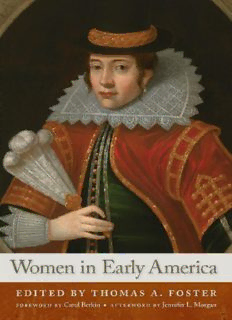
Women in Early America PDF
Preview Women in Early America
Women in Early America This page intentionally left blank Women in Early America Edited by Thomas A. Foster Foreword by Carol Berkin Afterword by Jennifer L. Morgan NEW YORK UNIVERSITY PRESS New York and London NEW YORK UNIVERSITY PRESS New York and London www.nyupress.org © 2015 by New York University All rights reserved References to Internet websites (URLs) were accurate at the time of writing. Neither the author nor New York University Press is responsible for URLs that may have expired or changed since the manuscript was prepared. Library of Congress Cataloging-in-Publication Data Women in early America / edited by Thomas A. Foster ; foreword by Carol Berkin ; afterword by Jennifer L. Morgan. pages cm Includes bibliographical references and index. ISBN 978-1-4798-7454-5 (cl : alk. paper) — ISBN 978-1-4798-9047-7 (pb : alk. paper) 1. Women—United States—History—17th century. 2. Women—United States—History— 18th century. 3. Women—United States—Social conditions. 4. United States—History— Colonial period, ca. 1600-1775. 5. United States—Social conditions—To 1865. I. Foster, Thomas A., editor. HQ1416.W656 2015 305.4097309’032—dc23 2014040537 New York University Press books are printed on acid-free paper, and their binding materials are chosen for strength and durability. We strive to use environmentally responsible suppliers and materials to the greatest extent possible in publishing our books. Manufactured in the United States of America 10 9 8 7 6 5 4 3 2 1 Also available as an ebook For Marlon This page intentionally left blank Contents Foreword: Meeting the Challenges of Early American Women’s History ix Carol Berkin Acknowledgments xi Introduction: Women in Early America: Crossing Boundaries, Rewriting Histories 1 Thomas A. Foster 1. Doña Teresa de Aguilera y Roche before the Inquisition: The Travails of a Seventeenth-Century Aristocratic Woman in New Mexico 7 Ramón A. Gutiérrez 2. “Women Are as Knowing Therein as the Men”: Dutch Women in Early America 43 Kim Todt 3. Women as Witches, Witches as Women: Witchcraft and Patriarchy in Colonial North America 66 Matthew Dennis and Elizabeth Reis 4. Servant Women and Sex in the Seventeenth-Century Chesapeake 95 Betty Wood 5. Rebecca Kellogg Ashley: Negotiating Identity on the Early American Borderlands, 1704–1757 118 Joy A. J. Howard 6. Womanly Masters: Gendering Slave Ownership in Colonial Jamaica 139 Christine Walker vii viii | Contents 7. Women at the Crossroads: Trade, Mobility, and Power in Early French America and Detroit 159 Karen L. Marrero 8. The Agrarian Village World of Indian Women in the Ohio River Valley 186 Susan Sleeper-Smith 9. Loyalist Women in British New York City, 1776–1783 210 Ruma Chopra 10. “I Knew That If I Went Back to Virginia, I Should Never Get My Liberty”: Ona Judge Staines, the President’s Runaway Slave 225 Erica Armstrong Dunbar 11. “The Need of Their Genius”: A Women’s Revolution in Early America 246 Mary C. Kelley Afterword: Women in Early America 271 Jennifer L. Morgan About the Contributors 275 Index 279 Foreword Meeting the Challenges of Early American Women’s History Carol Berkin In the 1970s, the scholarly study of American women’s history was in its infancy and its focus was largely on the nineteenth century. Toward the end of the decade, however, a group of intrepid—or, as others saw us, foolhardy—scholars began to commit themselves to the study of colo- nial and Revolutionary era women. Friends and advisors warned against it: best, they said, to continue to tread the paths that had led to publi- cations and, in several cases, tenure at respectable universities. It was not that these colleagues necessarily lacked sympathy for the topic; they simply doubted it could be tackled. Everyone knew there were simply no sources to mine, no archives sheltering untapped treasures, and no big questions around which to shape an argument. Despite all the good advice, the women of my generation persisted. Dogged research—and sometimes stubborn challenges to archivists— turned up diaries and letters, buried under inventory labels like “mis- cellanea” and “family records.” Women’s voices, it appeared, were not forever lost; they could be recovered. And women’s experiences could be reconstructed. Articles and books began to appear, a mélange of con- tribution history, victim narratives, and accounts of resistance to estab- lished gender ideology. Our primary focus was recovery and restoration, and our goal was to repopulate the canvas of the colonial and Revolu- tionary eras with women as participants in shaping that world. Much of the work we did, like pioneer work in any field, will not stand the test of time. For example, the voices we discovered were, with few exceptions, those of white elite women, and thus they emerged as the central actors in our earliest efforts. Too often we universalized their experiences, assuming that they were the American woman. And, much ix
Description: